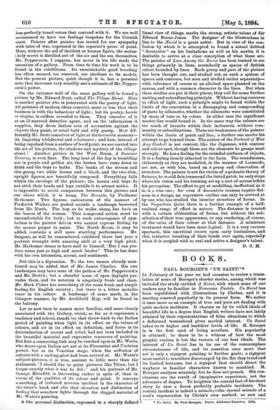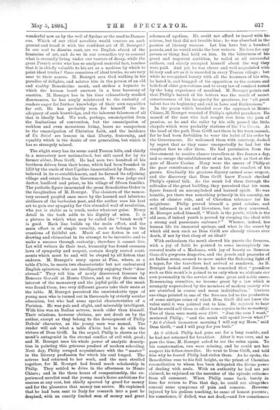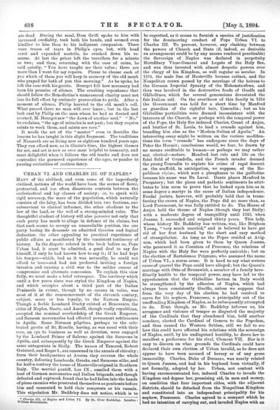BOOKS.
PAUL BOURGET'S "UN SAINT."*
IN February of last year we had occasion to review a trans- lation of some of Bourget's shorter stories, among which was- included the study entitled A Saint, with which some of our- readers may be familiar in Nouveaux Pastels. Un Saint has been republished with illustrations by Chabas, and it is- meeting renewed popularity in its present form. We notice it once more as an example of true and pure art dealing with quite modern incidents. It charms us by its veiled ideals of beautiful life in a degree that English writers have not lately attained by their representations of false situations to which a deformed womanhood gives morbid interest. Un Saint takes us to higher and healthier levels of life. M. Bourget is in the first rank of living novelists. His popularity is attained ; he dares to be a witness of how the most graphic realism is but the vesture of our best ideal's. The- interest of Un Saint lies in its use of the commonplace circumstances of life, and its assertion once more that art is only a signpost pointing to further goals; a signpost most useful to travellers discouraged by the flat they tread and• its limited horizons, but a signpost that should direct the wayfarer in familiar characters known to mankind: M. Bourget analyses minutely, but he does not preach. His con- clusions are the result of imaginative experience,. not the advocates of dogma. To heighten the centralfact of his short story be uses a dozen perfectly probable incidents. The central incident is indeed a miracle,—the eternal miracle of a soul's regeneration by Christ's own method, as new and • Un Saint. By Paul Bourget. Perla : Alphonse Lemerre. 1594.
wonderful now as by the well of Sychar or the road to Damas- cus. Which of our chief novelists would venture on such ground and tread it with the confident art of M. Bourget ? In our zeal to dismiss cant, are we English afraid of the fountains of art, and do we in our cowardice try to conceal what is eternally living under our vesture of decay, while the great French artist who has so analysed material fact, teaches that it is chiefly valuable to his art as a medium by which to paint ideal truths ? Once conscious of ideal truths, we are very near to their source. M. Bourget sees God walking in his paradise of delights, and salutes him in the person of an old and shabby Benedictine monk, and strikes a keynote to which the human heart answers in a true harmony of emotion. M. Bourget has in his time exhaustively studied dissonances, he has amply ministered to the curiosity of readers eager for farther knowledge of their own capacities for evil. He has probably seen for himself the in- adequacy of such knowledge, and the inherent falseness of all that is ideally bad. We seek, perhaps, emancipation from the limitations of convention, but the emancipation of reckless and even monstrous living,, bears no .comparison to the emancipation of Christian faith, and the incidents of Un Saint are lessons in that liberty, fraternity, and equality which is the desire of our generation, bat which it has so strangely missed.
The slight story has its scene amid Tuscan hills, and chiefly in a monastery now nationalised, but still cared for by its former abbot, Dorn Griffi. He had seen two hundred of his brethren driven from their home, which had been'foanded in 1259 by the uncle of that Ugolino immortalised by Dante. He believed in its re-establishment, and he farmed its adjoining village and estate from the Government. He was judge and doctor, landlord and priest, to his village of fifteen families. The pathetic figure incarnated the great Benedictine Order in the imagination of M. Bourget. The cloisters of the monas- tery seemed peopled once more by the learned and laborious civilisers of the barbarian past, and the author uses his hest art to gain our sympathy for this stranded waif of revolution, who yet is stable as is truth, under whatever guise. Every detail in the book adds to his dignity of mien. It is a picture in which what may be called the " brush work" is good. Each line builds up the main effect, and the main effect is of simple veracity, such as belongs to the creations of faithful art. Mach of our fiction is out of drawing and chimerical in its attempt to be inventive and to make a success through curiosity ; therefore it cannot live. Let wild writers do their best, humanity has found common laws of sympathy and respect. certain deeply rooted senti- ments which must be and will be obeyed by all fiction that endures. M. Bourget's story opens at Pisa, where, at a table d'hôte, he meets two characteristic but not caricatured English spinsters, who are intelligently enjoying their "dear abroad." They tell him of newly discovered frescoes by Benozzo Gozzoli at Monte Chiaro, and as they discuss the interest of the monastery and the joyful pride of the monk who found them, two very different guests take their seats at the table. H. Bourget perceived the unmistakable type of young man who is turned out in thousands by strictly secular education, but who had some special characteristics of a Parisian. He was pale and slight, and miserably intelligent. With him was an Italian actress, much older than himself. Their relations, however obvious, are not dwelt on by the author, except as they belong to the development of Philip Dubois' character, as the young man was named. The reader will ask what a table d'hôte had to do with the virtues of Dom Griffi. In the sequel, Philip is shown as the monk's antagonist in the eternal conflict of evil with good ; and M. Bourget uses his whole power of analytic descrip- tion in painting this grievous product of modern schooling. Next day, Philip scraped acquaintance with the " master " in the literary profession for which his soul longed. The actress had returned to her work, and the men strolled together, for H. Bourget had found much scholarship in Philip. They settled be drive in the afternoon to Monte Chiaro ; and in the three hours of companionship, the ex- perienced novelist read the young man's fierce ambitions for success at any cost, but chiefly spurred by greed for money and for the pleasures that money can secure. He explained that he had been sent to Italy for research into a past he despised, with an exactly limited sum of money and great schemes of egotism. He could not afford to travel with his actress, but that did not trouble him ; he was absorbed in the passion of literary success. Let him have but a hundred pounds, and he would outdo the best writers. No love for any person or thing had hold on him. In the bitterness of his greed and impotent ambition, he railed at all successful authors, and chiefly occupied himself about the way they were paid. And yet he was clever and well acquainted with hi:tory and art as it is recorded in every Tuscan village ; but while he recognised beauty with all the keenness of his wits, he hated it, and bragged of his opposition to the canons and beliefs of elder generations and to every law of conduct tested by the long experience of mankind. H. Bourget points out that Philip's hatred of his betters was the result of secret consciousness of his incapacity for greatness, for " all great talent has its beginning and end in Love and Enthusiasm."
In the peace which brooded over the approach to Monte Chiaro, M. Bourget wearied of Philip's spiteful paradoxes. He mused of the men who had sought rest from the pain of passion, as he and the railer by his side passed the little chapels which were probably stations of the Via Cracis. At the head of the path Dora Griffi met them in his worn cassock, for he had been forbidden to wear the habit of his order by the Government. He welcomed them with courtesy, dashed by regret that as they came unexpectedly be had but the simplest fare to offer them. He had permission from the Government to receive chance travellers at five francs a day, and so escape the establishment of an inn, such as that at the gate of Monte Casino. Many were the sneers of Philip at the poor contrivances of the monk for the comfort of his guests. Gradually his gracious dignity earned some respect, and the discovery that Dom Griffi knew French checked Philip's cynical talk. As the monk led them through the solitudes of the great building, they perceived that his worn figure framed an accomplished and learned spirit. He was humble, yet there was something princely in his amenity, an echo of cloister rule, and of Christian tolerance for his neighbour. Philip proved himself a good scholar, and well informed in art and literature, but as they conversed, H. Bourget asked himself, " Which is the youth, which is the old man, if indeed youth is proved by clasping the ideal with a strong and passionate embrace ? " Whence, indeed, has human life its immortal springs, and what is the secret by which old men such as Dom Griffi are already victors over death, if not by that clasp of an ideal?
With enthusiasm the monk showed his guests the frescoes, with a joy of faith he pointed to some incompletely =- covered traits of a Madonna, with joy of beauty as Benozzo Gozzoli's gorgeous draperies, and the jewels and peacocks of an Indian scene, seemed to move under the flickering light of a taper, for the travellers bad arrived at sundown. As M. Bourget looked and listened, he remarked that " grandeur such as this monk's is gained to us only when we abdicate our own personality in the service of some great and noble cause. Renouncing ourselves, we become great by a law which is strangely unperceived by the members of modern society who are absorbed in coarse and mean individualism." Curious ear-rings painted in one of the frescoes led to the production of some antique coins of which Dom Griffi did not know the value until it was pointed out to him. He rejoiced to hear that he could sell them to effect some repairs in the monastery. Two of them were worth over £100. " Just the sum I want," muttered Philip; "and the monk will spend it—in what ?" " At 6 o'clock to-morrow morning I will say my Mass," said Dom Griffi, " and I will pray for you both."
At 6 o'clock Philip had gone out for a long ramble, and he had not returned for breakfast. After it was over, and to pass the time, IL Bourget asked to see the coins again. To his consternation, two were missing, and he could not but suspect his fellow-traveller. He went to Dorn Griffi, and told him why he feared Philip had stolen them. As he spoke, the Benedictine rose to his full height, as the priest of Christian reconciliation to whom has been delegated the divine power of dealing with souls. With an authority he had not yet claimed, he enjoined on the narrator of the episode reticence from all comment. When Philip came back, barely in time for return to Pisa that day, he could not altogether conceal some symptoms of pain and remorse. However injured by his godless teaching, he came of honest parents ; his conscience, if dulled, was not dead,—and few consciences
are dead. During the meal, Dom Griffi spoke to him with increased cordiality, took both his bands, and seemed even kindlier to him than to his indignant companion. There were traces of tears in Philip's eyes, but, with head erect and expanded nostrils, he crushed down his re- morse. At last the priest left the travellers for a minute or two; and then, returning with the case of coins, he said quietly, "You have taught me their value; there are more than I want for my repairs. Please to choose each of you which of them you will keep in memory of the old monk who prayed for both of you this morning." As he spoke, he left the case with his guests. Bourget felt how necessary had been his promise of silence. The crushing repentance that should follow the Benedictine's unmeasured charity must not lose its full effect by untimely provocation to pride. After a moment of silence, Philip hurried to the old monk's cell. What passed there no man will ever know ; but in the last look cast by Philip on the man whom he had so flouted and scorned, M. Bourget saw " the dawn of another soul." " No," he exclaims, "the age of miracles is not past; but they require saints to work them, and saints are rare."
It needs the art of the "master" even to describe the lessons he has taught in this slight fragment. The traditions of Nazareth are as living now as eighteen hundred years ago. They can afford now, as in Giotto's time, the highest themes for art, and art is now as ever most helpful to humanity, and most delightful when it follows the old tracks and does not contradict the garnered experience of the ages, or pander to passing curiosities of restless fancy.








































 Previous page
Previous page